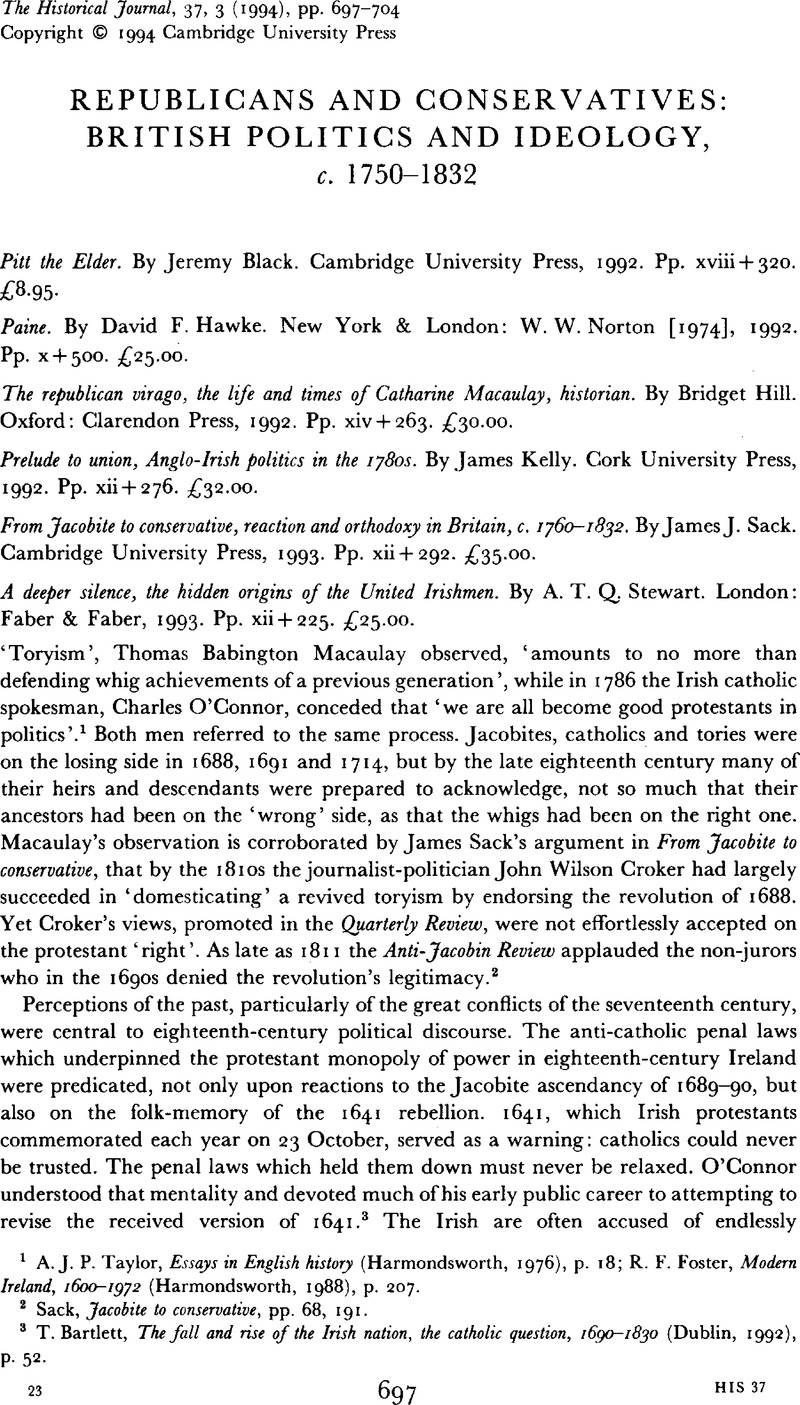No CrossRef data available.
Article contents
Republicans and conservatives: British politics and ideology, c. 1750–1832
Published online by Cambridge University Press: 11 February 2009
Abstract

- Type
- Review Articles
- Information
- Copyright
- Copyright © Cambridge University Press 1994
References
1 Taylor, A. J. P., Essays in English history (Harmondsworth, 1976), p. 18Google Scholar; Foster, R. F., Modern Ireland, 1600–1972 (Harmondsworth, 1988), p. 207.Google Scholar
2 Sack, , Jacobite to conservative, pp. 68, 191.Google Scholar
3 Bartlett, T., The fall and rise of the Irish nation, the catholic question, 1690–1830 (Dublin, 1992), p. 52.Google Scholar
4 MacDonagh, O., States of mind, two centuries of Anglo-Irish conflict, 1780–1980 (London, 1992 edn), p. 1.Google Scholar
5 Hawke, , Paine, p. 129.Google Scholar
6 Hill, , Republican virago, pp. 220–1.Google Scholar
7 Sack, pp. 31, 199.
8 Sack, pp. 35, 199.
9 Monod, P. K., Jacobitism and the English people, 1688–1788 (Cambridge, 1989), pp. 152, 202–20.Google Scholar
10 Hawke, p. 224.
11 After thirty years Robbins's, CarolinThe eighteenth-century commonwealthmen (Cambridge, Mass., 1959)CrossRefGoogle Scholar remains an invaluable guide to this subject.
12 Hill, pp. 30–1, 35–6, 170.
13 Hill, pp. 3–4.
14 Hill, p. 178.
15 This is the thesis put forward in Wells, R., Insurrection: the British experience, 1795–1805 (Gloucester, 1983).Google Scholar
16 Hill, pp. 46, 75–6.
17 Hawke, p. 241.
18 Stewart, , A deeper silence, p. 135.Google Scholar
19 Smyth, J., The men of no property, Irish radicals and popular politics in the late eighteenth century (London, 1992), pp. 80–4.Google Scholar
20 Stewart, A. T. Q., The narrow ground, the roots of conflict in Ulster (London, 1989 edn), p. 102.Google Scholar
21 E.g., on p. 34 he writes of ‘the shadowy agrarian organizations which seemed to spring up after 1760’, thereby choosing to ignore the social and economic explanations for the genesis of these secret societies advanced by James Donnelly, Jnr., Michael Beames and others. On p. 39 he quotes Grattan's famous ‘Spirit of Swift, spirit of Molyeneux’ speech, citing Stephen Gwynn's 1939 Grattan and his times as the source. The reader is not told that Gerard O'Brien has shown just how severely tainted is the evidence for the speech ever having been made: ‘The Grattan mystique’, Eighteenth-Century Ireland, I (1986), 177–94.Google Scholar
22 For other recent work on this topic see Tesch, P., ‘Presbyterian radicalism’Google Scholar and McBride, I., ‘William Drennan and the dissenting tradition’, in Dickson, D., Keogh, D. and Whelan, K., eds., The United Irishmen, republicanism, radicalism and rebellion (Dublin, 1993), pp. 33–48, 48–61.Google Scholar
23 Stewart, p. 71.
24 For caveats concerning the influence of teachers on pupils as an explanation for the Enlightenment see Camic, C., Experience and Enlightenment, socialization for cultural change in eighteenth-century Scotland (Edinburgh, 1983), pp. 186–7 n. 42.Google Scholar
25 Hill, pp. 20, 234.
26 Robbins, C., ‘“When is it that colonies may turn independent?”: an analysis of the environment of Francis Hutcheson (1694–1746)’, William and Mary Quarterly, 3rd ser. XI (1954), 214–51CrossRefGoogle Scholar; Maier, P., From resistance to revolution, colonial radicals and the development of opposition to Britain, 1765–1775 (New York, 1974), pp. 33–4, 39Google Scholar; Stewart, , A deeper silence, p. 101.Google Scholar
27 Quoted in Hawke, p. 216.
28 Clark, J. C. D., English society, 1689–1832 (Cambridge, 1985), p. 239 n., and ch. 5. passimGoogle Scholar; Bradley, J. E., Religion, revolution and English radicalism, non-conformity in eighteenth-century politics and society (Cambridge, 1990), pp. 134, 138.CrossRefGoogle Scholar
29 Brooke, P., Ulster presbyterianism, the historical perspective, 1610–1970 (Dublin, 1987)Google Scholar; Stewart, p. 131.
30 On Russell see Woods, C. J. (ed.), Journals and memoirs of Thomas Russell, 1791–5 (Dublin, 1991)Google Scholar; Smyth, , Men of no property, pp. 165–6.Google Scholar
31 Stewart, , A deeper silence, pp. 121–2Google Scholar; Hill, pp. 172–3.
32 Black, pp. 45, 139–40.
33 Black, pp. 19, 39, 243–7, 255–7, 282, 286; Hill, p. 40.
34 O'Brien, G., Anglo-Irish politics in the age ojGrattan and Pitt (Dublin, 1987), pp. 168–9.Google Scholar
35 Kelly, pp. 4, 27–8, 40, 64, 74.
36 Kelly, pp. 65, 162.
37 Sack, pp. 233, 245.
38 Sack, pp. 240–2. For a provocative interpretation which sees Burke's catholic sympathies as the key to understanding his life and career: O'Brien, C. C., The great melody: a thematic biography and commented anthology of Edmund Burke (London, 1992).Google Scholar


